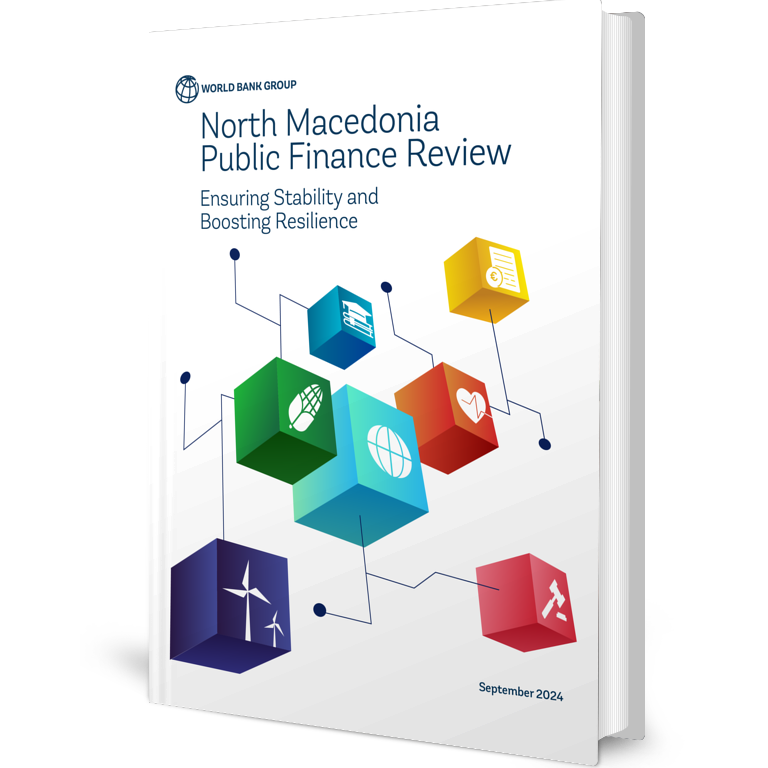
As North Macedonia looks beyond a period of multiple overlapping shocks, it is timely for the country to take steps to achieve lasting fiscal consolidation.
The report highlights that, without a sustained and sufficient medium-term fiscal adjustment, fiscal and macroeconomic risks could escalate, with further rises in borrowing costs affecting private sector, stifling investments, and dragging on the overall economic recovery.
Full Report | Press Release | Infographic
Key Findings and Recommendations
The report calls for restoring fiscal sustainability and rebuilding buffers through a set of policy measures.
Boosting Tax Revenues
North Macedonia has a potential to improve its tax efficiency and increase the collections. The World Bank report argues a potential to raise tax revenues by 3.5 percentage points of GDP in the short term to support fiscal consolidation and sustainable growth. Beyond rationalizing exemptions, introducing progressivity, and increasing environmental and property taxation, the country should prioritize strengthening tax administration to improve compliance and revenue collection.
Enhancing the Effectiveness of Public Administration
Although North Macedonia spends less on public administration compared to its EU peers, the report highlights the need to enhance public administration effectiveness. The government should implement reforms to improve efficiency and professionalize public administration. Savings achieved over the medium term through staff rationalization, aimed at creating a leaner administration, should be reinvested in promoting professional and high-performing personnel based on strengthened performance management.
Rebalancing Local Government Finances
Numerous small local government units and significant regional disparities in North Macedonia affect the service delivery, and lead to high administrative costs and inefficiencies. To address these issues, it is essential to redefine spending responsibilities to avoid duplication, enhance accountability, and achieve economies of scale through decentralization or territorial reorganization.
Improving the Efficiency, Equity and Delivery of Health Care
To address the challenges of an aging society, North Macedonia needs to improve the efficiency of public spending and expand access to high-quality health care services, including long-term care. This involves enhancing primary care, health promotion, prevention, and coordination across healthcare providers, as well as developing a sustainable long-term care system and reorganizing the hospital sector. Increasing health taxes would contribute to lower incidence of non-communicable diseases and avert premature deaths.
Strengthening Social Assistance
The social assistance reform in North Macedonia has improved coverage and benefit adequacy, but further efforts are needed to sustain and enhance poverty-targeted programs. The report recommends ensuring that the reform reaches all eligible individuals, expanding coverage to protect against new vulnerabilities, using unified eligibility criteria, implementing "make-work-pay" benefit reforms, and intensifying activation measures for the long-term unemployed.
Ensuring the Sustainability of the Pension System
North Macedonia's pension deficit is high and will increase further without reform. Considering the growing aging society, the report suggests several policy options, including reversing the recently introduced price-wage (so-called Swiss) pension indexation pattern back to previous CPI indexation, gradually increasing and equalizing retirement ages for men and women, and gradually raising contribution rates.
Financing the Future: Improving the Efficiency of Education Spending
North Macedonia's education spending decreased over the past twelve years, reaching 3.8 percent of GDP in 2022, but its efficiency also worsened. Key measures to enhance spending efficiency include optimizing the school network, reassessing student-teacher ratios and class sizes, reallocating resources to non-salary-related spending, and improving public financial management. Priorities should include implementing a new funding formula for primary education and gradually optimizing the primary school network.
Improving the Efficiency of Public Procurement
The government e-procurement portal enhanced the transparency and efficiency of the public procurement, allowing the analysis of non-competitive public procurement practices and corruption risks. The report indicates a moderate risk of corruption, with some institutions using high-risk procurement practices. To improve procurement spending, measures to increase competition, such as increasing the number of bidders and reducing market concentration, are recommended. Implementing efficiency-enhancing measures within the existing legal framework could save the government 1.6 percent of GDP.
Rationalizing Agriculture and Rural Development Subsidies
North Macedonia has to improve the efficiency of agricultural subsidies for the country's economic transition and resilience. By aligning agricultural policies with the EU's Common Agricultural Policy and implementing targeted reforms, the country can enhance the productivity and competitiveness of its agricultural sector. This would also mean abolishing the tobacco growing subsidies, and reallocating funding to food production and greening practices.